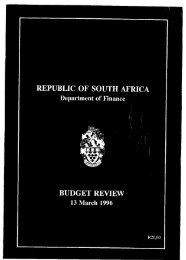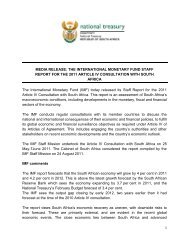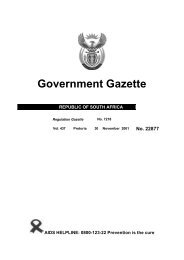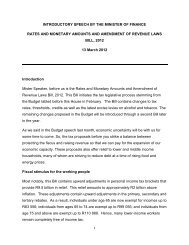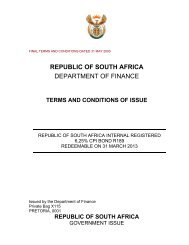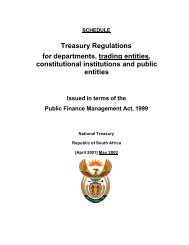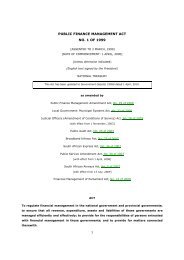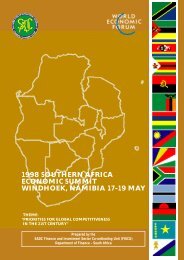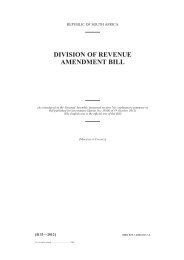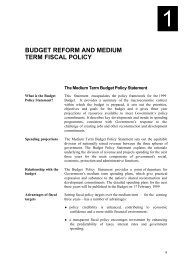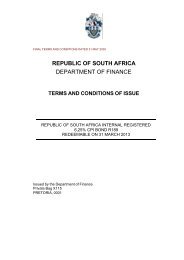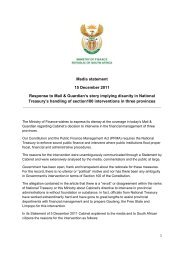Annual Performance Plan Jaarlikse ... - National Treasury
Annual Performance Plan Jaarlikse ... - National Treasury
Annual Performance Plan Jaarlikse ... - National Treasury
You also want an ePaper? Increase the reach of your titles
YUMPU automatically turns print PDFs into web optimized ePapers that Google loves.
The introduction of ‘no- fee schools’ to ensure access for all to the schooling system has been a major progress in this<br />
regard, as will the intensified efforts at quality upliftment through resource provision, delivery of textbooks, desks, water and<br />
sanitation.<br />
Building the capacity of educators and principals to support and manage teaching and learning programmes at schools is<br />
critical to the continued improvement in quality education. Upgrading the competence and professional qualifications of<br />
teachers is crucial to education and human development over the longer term. A teacher development programme is<br />
already under way, aimed at upgrading the qualifications of existing teachers to meet the requirements of the new<br />
curriculum, especially mathematics literacy and life orientation, as well as leadership and management skills of school<br />
principals.<br />
The education sector is also aligned to the national priorities such as the ASGI-SA. FET Colleges are key to the agreed<br />
strategies in this regard. FET Colleges are being revitalised to provide technical and vocation programmes to ensure that<br />
learners have differentiated options in education. Provision is also being made for the introduction of a FET bursary and<br />
student loan programme to support access of disadvantaged students to vocational education opportunities.<br />
The DoE plans to initiate a mass adult literacy programme in 2007/08 to address the challenges of basic literacy both as a<br />
human right and a contributor to social cohesion. This will be done through partnerships with non-governmental<br />
organisations, adult basic education centres and volunteers.<br />
A.2.3 The organisational challenges<br />
The WCED, being the largest employer in the Western Cape Provincial Government, comprises the Provincial Ministry of<br />
Education, headed by the Member of the Executive Council responsible for Education (MEC), a provincial head office, district<br />
offices and educational institutions, including public ordinary and special schools, FET Colleges, adult community learning<br />
centres and ECD sites.<br />
WCED activities – scope and scale<br />
Learners * 938 056<br />
Public ordinary schools ** 1 450<br />
Schools for learners with special needs # 67<br />
Further education and training institutions (technical colleges) 6 (39 sites)<br />
Adult community learning centres 112 (301 sites)<br />
Subsidised pre-primary schools 446<br />
District offices (EMDCs) 7<br />
Educators (Post Provisioning Model) 30 872<br />
Public service staff (approved establishment) 8 823<br />
*2006: CEMIS Current (13 October 2006) (Grades Pre-Gr R to Post Matric)<br />
** Institutions current (All public ordinary schools, Grades Pre-Gr R to Post Matric)<br />
# Source – 2006 Snap Survey and 2006 <strong>Annual</strong> Schools Survey<br />
1. Organisational re-design<br />
The department is undergoing a major organisational re-design to ensure that it can deliver on the HCDS. The aims of the<br />
re-design process are to –<br />
• Build institutional capacity in support of iKapa elihlumayo’s lead strategies, of which the HCDS is the main lead strategy;<br />
• Enhance service delivery;<br />
• Accelerate employment equity; and<br />
• Achieve the envisaged educational outcomes.<br />
<strong>Annual</strong> <strong>Performance</strong> <strong>Plan</strong> 2007/08 – 2009/10<br />
9



